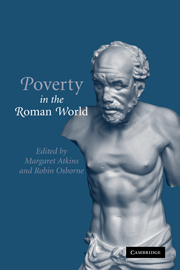Book contents
- Frontmatter
- Contents
- List of contributors
- Preface
- List of abbreviations
- Chapter 1 Introduction: Roman poverty in context
- Chapter 2 The poor in the city of Rome
- Chapter 3 Stratification, deprivation and quality of life
- Chapter 4 ‘You do him no service’: an exploration of pagan almsgiving
- Chapter 5 Writing poverty in Rome
- Chapter 6 Poverty and population in Roman Egypt
- Chapter 7 A pragmatic approach to poverty and riches: Ambrosiaster's quaestio 124
- Chapter 8 Portraying the poor: descriptions of poverty in Christian texts from the late Roman empire
- Chapter 9 Throwing parties for the poor: poverty and splendour in the late antique church
- Chapter 10 Salvian, the ideal Christian community and the fate of the poor in fifth-century Gaul
- Chapter 11 Poverty and Roman law
- Bibliography
- Index
Chapter 10 - Salvian, the ideal Christian community and the fate of the poor in fifth-century Gaul
Published online by Cambridge University Press: 22 September 2009
- Frontmatter
- Contents
- List of contributors
- Preface
- List of abbreviations
- Chapter 1 Introduction: Roman poverty in context
- Chapter 2 The poor in the city of Rome
- Chapter 3 Stratification, deprivation and quality of life
- Chapter 4 ‘You do him no service’: an exploration of pagan almsgiving
- Chapter 5 Writing poverty in Rome
- Chapter 6 Poverty and population in Roman Egypt
- Chapter 7 A pragmatic approach to poverty and riches: Ambrosiaster's quaestio 124
- Chapter 8 Portraying the poor: descriptions of poverty in Christian texts from the late Roman empire
- Chapter 9 Throwing parties for the poor: poverty and splendour in the late antique church
- Chapter 10 Salvian, the ideal Christian community and the fate of the poor in fifth-century Gaul
- Chapter 11 Poverty and Roman law
- Bibliography
- Index
Summary
Around the middle of the fifth century ad, Salvian, presbyter of the church at Marseilles, delivered a blistering broadside at the conduct of his fellow Christians. A considerable portion of this diatribe, under the title De Gubernatione Dei (Concerning the Governance of God, abbreviated here as DGD) has survived, and the themes and tenor of the work are clear. The text reveals a senior member of the Gallic clergy attempting to come to terms with what he perceived to be the eclipse of Roman culture and society in Gaul and elsewhere in the western provinces of the Roman empire. Salvian ascribed this decline not to the destructive influence of barbarians, but to a decline in the morals of Romans themselves (DGD 5.4.16–18, 5.6.25; cf. Ep. 9). Indeed, he suggested that it was only among barbarians and marginalised groups such as the Bagaudae that civilised Roman behaviour could now be found (DGD 5.5.21–2).
Salvian focused considerable attention upon the depredations of the imperial tax machinery, the abuses visited upon small landowners by the members of the curial class, and the desperate ends to which these drove the poor. As a consequence, his testimony was long a staple for scholars seeking confirmation that the late Roman empire was in inexorable decline, as a result of barbarian invasions, high levels of taxation and a fragmenting social fabric.
- Type
- Chapter
- Information
- Poverty in the Roman World , pp. 162 - 182Publisher: Cambridge University PressPrint publication year: 2006
- 3
- Cited by

